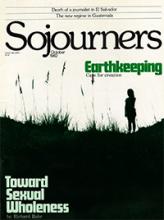Despite years of heightened awareness of global environmental threats, with scores of international efforts to address specific problems and thousands of national and local laws and regulations adopted to protect the environment, the life-supporting ecosphere of our planet remains gravely and severely threatened. First, humanity now possesses the power to destroy the creation. Jonathan Schell in The Fate of the Earth correctly identifies this as an ecological peril: "The nuclear peril is usually seen in isolation from the threats to other forms of life and their ecosystems, but in fact it should be seen as the very center of the ecological crisis."
Second, humanity is coming to possess an unprecedented power to create and manufacture new forms of life. This is not simply a neutral technological development. Rather, humanity's ability to alter the basic design of living things and bring into being totally new forms of life marks a watershed in our relationship to the creation. Society's dominant understanding of nature and metaphysical view of reality is being transformed by the ability to create and market life.
The parameters to future possibilities in bioengineering are being set not by moral or theological judgments, nor by governmental guidelines, but simply by economic feasibilities. Rather than name the species created by God, and care for them two by two, ensuring life's continuity, humanity has decided it will now create the species of life to satisfy its own selfish whims.
Thus, in its contemporary technological ability to destroy and create life, humanity strives to replace God, in belief and in practice, as the ruler over creation.
Read the Full Article

